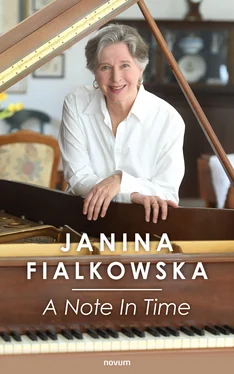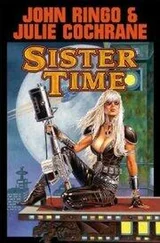1 ...7 8 9 11 12 13 ...17 Around my sixteenth birthday I matriculated with honours and the following year received my Baccalauréat and Maîtrise in music from the Université de Montréal. And so it was that, at the age of seventeen, I became a full-time musician without having the slightest notion of what a career in music actually entailed. I had not made any choices; it had all just happened.
But before I close this chapter on my school years, I must introduce here a character who played one of the most important roles in my life.
Dana
It was shortly after Peter was sent to boarding school that Biddy and I drove over to V.D. one evening for my Monday lesson.
When we arrived, a little girl was sitting on the piano stool chatting with Soeur Stella in her studio. She was tiny, with arms and legs like toothpicks, rich dark brown hair tied back in two pigtails, big sparkling brown eyes and a mouth full of braces. She was giggling and laughing. Her name was Dana and her parents had sent her to V.D. from Buffalo to study with Paul Loyonnet, the other “big” professor teaching at the school. For a second, I was really put out by Dana’s presence: I was supposed to be Soeur Stella’s little girl and prize pupil. Who was this usurper? My jealousy lasted about five minutes because Dana was irresistible. And from that day on we became lifelong best friends.
Dana came from a dysfunctional family. Her father, who had sung at one time in the Metropolitan Opera Chorus, seemed to me to be peculiar, riddled with strange obsessions and habits. He loved Dana in his own way, but early on had decided she was a genius and that he would do everything he could to see her become another Rubinstein or Horowitz. Dana’s mother had had a rough childhood and was unsuited to having children of her own. She was certainly fond enough of Dana, but treated her more as one would a distant favourite cousin. She was a heavy smoker, a drinker and was clearly (and perhaps understandably) bored with her strange older husband. A good businesswoman, she travelled often for her job and had little thought or time for her daughter. Thus, at the age of twelve this English-speaking child who had never left home, who had been brought up Jewish like her father, was suddenly sent to Montreal to board with a French-speaking family and attend a French school run by Catholic nuns. It was her good fortune that she was put with Soeur Stella. But Soeur Stella was not able to be (nor was she permitted to even contemplate being) a surrogate mother to Dana, although she tried as best she could to fill the void. Dana must have been indescribably lonely, especially during her first few months away in the fall of 1963. I have a sad mental picture of her at that time sitting in front of the television in the students’ lounge all alone, sobbing as she watched the news reports of the assassination of President Kennedy: a lonely little American girl far from home. I felt lucky to have a domineering mother and doting father who would never dream of sending me away.
Every Wednesday night Biddy brought me to V.D. to attend courses in counterpoint and acoustics. Dana would be waiting impatiently for us to arrive; I would go off to the classes and Dana and Biddy would have their “Wednesday night chats.” She grew to adore not only Biddy, but also George, and would often tell me that she liked to pretend they were her parents.
That summer we both attended a three-week summer course at the school and boarded there for the duration. Although there were numerous classes and lessons, compared to what I went through during the winter at home it was a complete doddle and we had oodles of time to play and giggle and behave badly. We’d talk and laugh late into the night and when the supervising nun would bang on my door to see what all the commotion was about, Dana would quickly hide in the closet. I’m sure we fooled no one – I think the nuns were only too happy to see Dana, not to mention myself, carefree and having fun. One of our favourite pastimes was trying to sneak into the nuns’ cloistered area. I never managed it but, for her birthday, Soeur Stella secretly allowed Dana to run through the cloister on the condition that she kept running and didn’t stop to look.
Dana’s talent was extraordinary. This tiny little waif was already playing pieces like the Brahms F-minor-sonata and the Chopin 1st Scherzo. A few months after she arrived, she won the Montreal Symphony concerto competition. When she met the conductor afterwards, he asked her which concerto she would like to play for the winner’s concert the following year; “Beethoven’s 4th,” was her prompt reply. Soeur Aline feared this would be too much for her twelve-year-old protégée, but Dana learned the piece and performed it exquisitely. I recall being overcome with pride and emotion at hearing my friend play so touchingly well.
The following year William Tritt arrived. A “wunderkind” like Dana, with a sweet and loving personality, at age twelve he developed a huge crush on her, following her around like a faithful dog. To round off our circle of friends, there appeared a beautiful child named Marley Rynd, who played the violin as well as the double bass and whose mother, the archetypical Jewish mother, convinced that her daughter was being starved by the nuns, would bring over huge care packages from her local deli – bagels, cream cheese, lox, latkes, knishes – the lot. That summer we four were inseparable – a very happy group under the watchful eyes of the nuns and our highly involved (excluding Dana’s) parents. And then, just as suddenly as she had appeared, Dana suddenly vanished, and Bill, Marley and I were left to mourn her absence. Her father had decided that the nuns and M. Loyonnet weren’t good enough for his “treasure” and, just as she was finally settling in and had managed to create a whole new world and family for herself in Montreal, he yanked her out of the Vincent d’Indy School and sent her to New York to study with Nadia Reisenberg and to live alone in the Barbizon Hotel for Women. She was only fourteen.
The next time we had any news of her was when a telegram arrived from her father asking the nuns to pray for his daughter, who was dying. And how we prayed! It seemed unbelievable to all of us that this spunky, friendly little girl could be so gravely ill. Later, Dana told me that she had been feeling progressively weaker and dreadfully sick and had finally no longer been able to get out of her hotel bed. It was a reflection on her pathetic family relations that it never crossed her mind to call home to Buffalo for help. But, as Dana put it, somehow a latent maternal instinct prompted her mother to call her that very night for a chat. The next day Dana was flown to Buffalo and hospitalised. She was diagnosed with Hodgkin’s disease. The treatments in those days were close to barbaric: radical surgery, which left Dana with terrible scars, and massive doses of radiation which left her with one lung in shreds and also resulted in repeated cancer episodes.
But Dana was extraordinary and, far from being defeated, she was back in New York within months. After she graduated from the High School for the Performing Arts, her parents asked her where she wanted to study next and she replied, “Paris,” without hesitation, the city of her dreams. And so it was that she and I were reunited, this time as seventeen-year-olds in the City of Lights.
From the funny little girl with the big smile full of braces there suddenly appeared a beautiful young woman with long, gorgeous hair and a figure like a model. Having already been in Paris for a month, she was there to greet me and my parents when we arrived in September. She had already developed an exquisite Parisian accent and a great passion for Parisian life, and was savouring her every moment there.
But she also had a great need for human companionship and an even greater need for love and a home. Very soon she fell in love with a strange young man named Gérard. I never actually met Gérard but certainly heard all about him, or at least all that Dana deemed acceptable for me to hear! He was the first of a series of disastrous love affairs that plagued her life, although Gérard was one of the few who at least occasionally made her happy. Dana was one of the friendliest individuals in the world and one of the few people I have ever met who had had not an iota of prejudice in her. She was interested in people and wanted to be friends with everyone, whatever gender, race, size, colour, body-build, age, or religion they happened to be. It was quite natural for her to walk up to complete strangers and start a conversation … which is how she met Gérard. She had been standing on the Pont Neuf watching the Seine when he walked by. She asked him if he knew how deep the water was and they started a dialogue.
Читать дальше












